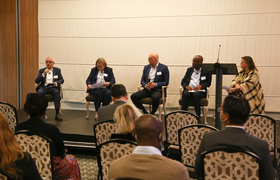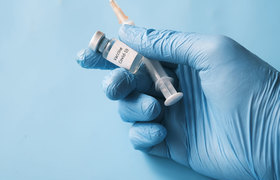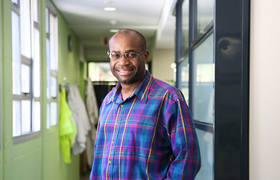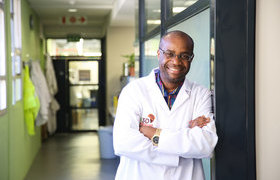UCT’s Kelly Chibale listed among Africa’s top 25 public health leaders
29 June 2022 | Story Helen Swingler. Photo Je’nine May. Read time 8 min.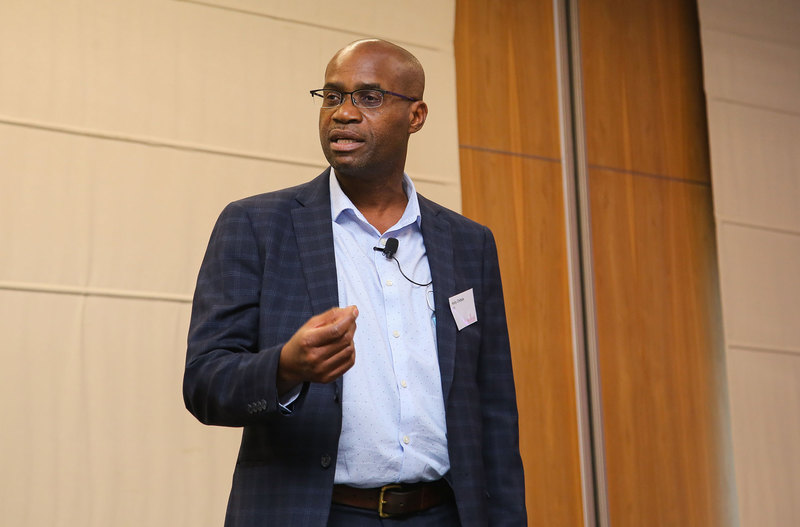
The University of Cape Town’s (UCT) Professor Kelly Chibale has been named among Harvard Public Health Magazine’s top 25 public health leaders in Africa. These “standout voices” include scientists, public health advocates and policy experts. Professor Chibale holds the Neville Isdell Chair in African-centric Drug Discovery and Development and is the director of H3D, UCT’s drug discovery and development centre. He responded to questions from UCT News.
Helen Swingler (HS): Congratulations! This is yet another accolade for you, UCT and African science. What does this recognition mean to you and the work of H3D? The Harvard TH Chan School of Public Health is a big name worldwide.
Kelly Chibale (KC): It means a lot in terms of the good fruit of a team effort. It is always humbling for me to be personally recognised for work God, my creator, has called me to do. However, although it is a personal accolade for which I am grateful, it is a team accolade. The team comprises all H3D staff and postdoctoral research fellows as well as our various research and funding partners – past and present. I am blessed to be the ‘vuvuzela’ of this team; I am privileged to lead. It also means a lot because the work of innovative drug discovery conducted at H3D is not typically acknowledged in the context of public health, which tends to be associated with the likes of hygiene, epidemiology, and disease prevention.
“When it comes to health innovation, South Africa arguably leads the way in Africa.”
HS: With six of the 25 public health leaders listed, South Africans are well represented. Is this indicative of the high regard for South African scientists and the way we work?
KC: Absolutely. We should be so proud and appreciative of the world-class scientific talent that is in South Africa. We punch above our weight in certain areas of health innovation and clinical expertise. When it comes to health innovation, South Africa arguably leads the way in Africa, with a robust research system comprised of excellent universities and science facilities that allow it to be a full-fledged contributor to the global scientific community – and an integral participant in international collaborations.
HS: The main feature of the Harvard Public Health Spring 2022 issue carries a subheading: “Africa’s changing up public health. The world should take note”. It refers to the continent’s community-focused approach to public health. Have African health sciences and community models been disregarded for too long?
KC: Yes! The role that African health sciences and communities have played in the COVID-19 pandemic has brought to the fore “out of Africa” innovation, capacity and infrastructure that are not currently acknowledged. There has also been good leadership at various levels on the African continent to coordinate responses to the pandemic, including leading advocacy efforts to keep public health in Africa high on the global health agenda.
HS: What does the focus mean for the Global South? It’s a highly visible platform and I know you are passionate about Africa growing its talent and creating job opportunities for young Africans here at home.
KC: It means others in the Global South can learn from H3D’s pioneering of a sustainable capacity-building, strengthening and skills development model that results in the creation of an absorptive capacity to attract, develop, nurture and retain skills on the African continent. We started with one platform and five postdoctoral scientists in chemistry at H3D outside my academic research group. Today we have an integrated platform across chemistry, biology and pharmacology with 76 staff and postdoctoral scientists. These are real direct jobs we have created.
“Africa needs partnerships to increase investments in science, skills development and infrastructure to provide sustainable and scalable health solutions.”
When I throw in my independent and separate academic group of PhD students and postdoctoral research fellows, we have more than 90 staff, postdoctoral scientists and research students making use of the H3D infrastructure we have created. This has been achieved through the development of a capacity-building model based on executing projects. These scale through sustained world-class excellence through networks of research and funding partnerships involving academia, industry, government, product development partners, and philanthropic organisations. This way all contributing partners share risks to share benefits. Africa needs partnerships to increase investments in science, skills development and infrastructure to provide sustainable and scalable health solutions.
HS: How does being named “a standout voice in African public health” reflect UCT’s Vision 2030 for you, specifically its massive transformative purpose of unleashing human potential for a fair and just society?
KC: H3D’s vision is very much aligned with UCT’s Vision 2030. The “H” in H3D stands for “Holistic”. In terms of the transformative purpose of unleashing human potential for a fair and just society, H3D is a place where African scientists can utilise their scientific skills and education to improve the health of African patients and to educate the next generation of African innovative research and development pharmaceutical scientists. Health equity in the context of African-centric drug discovery and development to improve treatment outcomes for people of African descent is at the core of what H3D does. Health equity is also reflected in the position I occupy as the Neville Isdell Chair in African-centric Drug Discovery and Development, thanks to a generous financial donation from Mr Neville Isdell, [a] UCT alumnus and former chair and chief executive of Coca-Cola, to establish the Chair.
HS: Are the other African public health leaders listed familiar names to you? Are you perhaps linked to them via collaborations and networks?
KC: Yes, I am familiar with most of them. The only one I have worked with directly is Helen Rees when I was a fellow member of the board of the South African Health Products Regulatory Authority (SAHPRA), before I stepped down from the board in 2019. Helen chairs the SAHPRA board.
“COVID-19 has exposed vulnerabilities in African health systems and emphasised the need to bolster Africa’s public health capacity.”
HS: You are an innovator at heart. What must Africa do to grow innovation in public health?
KC: COVID-19 has exposed vulnerabilities in African health systems and emphasised the need to bolster Africa’s public health capacity and infrastructure, including its drug innovation capabilities. We need to go beyond surveillance and genome sequencing by innovating in product development in the areas of vaccines and therapeutics. For Africa to improve health outcomes, there is a dire need to tap into local innovators and encourage them to fill in gaps and chart home-grown solutions. If properly harnessed, these innovations can leapfrog progress because of the relatively low costs. Now is the time for partnerships to increase investments in science, skills development and infrastructure to provide sustainable and scalable health solutions.
HS: Regarding your and H3D’s work, what can we look forward to in the immediate future? The Harvard bio on you mentions your work in “early-phase human clinical trials for the antimalarial drug”.
KC: The antimalarial drug in human clinical trials is old news! In terms of what is in the pipeline, I am very excited about what we are doing in the use of artificial intelligence and machine learning tools towards improving treatment outcomes in African patients through a combination of optimising dosages of medicines and stratifying patients for designed clinical trials. Watch this space for news on this front soon!
 This work is licensed under a Creative Commons Attribution-NoDerivatives 4.0 International License.
This work is licensed under a Creative Commons Attribution-NoDerivatives 4.0 International License.
Please view the republishing articles page for more information.







